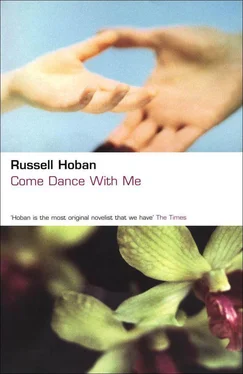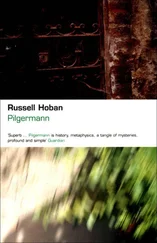‘Stop,’ said Jimmy, ‘I want to try it with that new riff I worked out yesterday.’ They fussed over that for a while, then Jimmy started again:
Django, gypsy on the edge of night,
Long time gone on roads nobody knows,
Gone with the singing where the fires burned bright,
Gone in the silence where the music goes.
Christabel came in with:
Gypsy me with you on your road so far,
Gypsy me fires on the edge of night,
Gypsy me under your wandering star,
Gypsy me Django burning bright.
She was looking right at me so she couldn’t miss the expression on my face. She was singing words that I’d written. Her voice was like breath on a mirror; it came and went with misty transience out of two big flat speakers that stood on legs and were only for the vocal. The way she sang gave me goose pimples and she herself seemed much affected by the song. She was quiet then while the band took over for a bit, then she and Jimmy came in together with:
Django, gypsy on the edge of night,
Django, Django burning bright.
They went through it again, elaborating on it the second time round; they used repetitions, they extended some lines and broke up others in strange ways but it was my poem, ‘Lament for Django’, living a strange new life with Mobile Mortuary. Hearing it come back to me in this incarnation was unsettling. They worked in quotes from Dies Irae and ‘California Dreaming’ in uneasy rhythms and odd intervals and it was unlike any musical experience I’d had before. When they finished they paused to fiddle with the new riff and argue technicalities.
I said to Christabel, ‘Did you set that poem to music?’
‘Yes. How’d you know it was a poem?’
‘It’s called “Lament for Django” and I wrote it.’
‘No you didn’t, it was written by Rodney Spoor.’
‘That’s me. I’m Rodney Spoor.’
‘I don’t believe it.’
“‘Lament for Django” was in a 1978 collection, Litanies and Laments, that I wrote under the name of Rodney Spoor.’
‘Jesus!’ said Christabel. ‘A poet! And I thought you were a perfectly respectable guy.’
‘I’m a doctor as I told you. When I wrote those poems I thought it would be a good idea to keep my literary life separate from my medical career. There hasn’t been any literary life since then so I might just as well not have bothered.’
‘I tried to get permission from your publisher,’ she said, ‘but they’ve gone out of business.’
‘Never mind that. What interests me is that you’re singing my words and something brought us together.’
‘Maybe. But let’s not talk about it.’
‘Why not?’
‘I’m superstitious.’
‘OK. We’ll talk about Django.’
‘Django!’
‘I’m not surprised that you like him. There’s a lot of you in his music’
‘Really?’
‘“Nuages”, for example. If he had known you he might have written that as a musical portrait of you.’
‘Of me!’ She had her head tilted to one side and was looking at me the way you look at someone when you think they might be getting at you.
‘Yes, of you.’
‘That’s a very nice compliment.’ Observing me narrowly. Not an easy woman to compliment.
‘I’m a very nice man, actually. Would you have dinner with me this evening?’
‘Why not?’ she said. ‘No reason to stop now.’
From the beginning of the rehearsal one of the crew had been busy at a bank of technology that looked able to handle the Ark Royal. ‘I’ve got that one on DAT,’ he said. ‘Do you Want to hear it back?’
‘Later,’ said Jimmy. To Christabel he said, ‘Whenever you can spare the time we’ll do “Did It Wasn’t?’”
‘Remember your blood pressure,’ said Christabel. ‘I’m ready now.’ To me she said, ‘This is a new song, all my own words wrote by me.’
The band did a Very spooky intro and then Christabel came in with:
Did it wasn’t, did it was?
Did I walking in the wasn’t, did you
running in the was?
Did you always, did you never?
Did it sometimes, was I clever?
Was it didn’t going to wasn’t be whatever?
Am I fuzzy, is there fuzz?
Did it wasn’t, did it was?
The words passed through themselves and seemed to take the present through the past and back again: Christabel’s past and mine, spiralled like a double helix. Why was I still single? For one thing, I never wanted to be in a position where a woman could leave me and wreck my life. My mother had been, as far as I could see, a perfect wife. She and my father seemed happy together, they looked at each other with loving looks. Then all of a sudden, with no warning at all, she was gone. Well, life isn’t fair, is it. We all know that and I’m not blaming my woman problems on my mother.
As a bachelor I’ve never lacked for companionship when I wanted it. Have I ever been in love? I don’t think so. There’s a chasm between men and women, and love is the rope you fling across. If the other person catches it you have the beginning of a suspension bridge. My rope always fell short. There have been serious girlfriends. The last one, when I was forty-four, was Nikki. She was twenty-seven, clever, had a great sense of humour, and was a stunner. Five foot eleven with a face of commanding beauty, blue eyes, and long dark hair. Better-looking than most models because she had lovely round arms and legs instead of sticks. I’m six foot one and considered not too ugly, so we made the kind of couple people turned to look at. She spoke French, German, Russian and Arabic and she worked in the Ministry of Defence. When I asked her what she did there she laughed and said, ‘If I tell you I’ll have to kill you.’ She said it as a joke but I didn’t ask again. I was of course proud to be seen with her and every man who saw us envied me. But it was a terrible strain, I was never convinced that I could hold on to her, and eventually I broke it off before she could dump me. What a relief. Was I in love with her? I guess she was more of a serious acquisition.
By the time I was in my fifties I was too set in my ways and too sunk in my work to look for a wife. Anyhow that’s what I told myself.
There’s a bronze nude on the Embankment by the Albert Bridge, just standing there thinking her thoughts. Her face turned to the river. I call her Daphne. I used to go jogging on the Embankment and I always patted her bottom as I went by. A limited relationship.
When Christabel finished the song, she and the others talked about the intro and the ending, then the band went into the instrumental bits of other numbers that needed work. Some of the titles were ‘Birdshit on Your Statue’, ‘No More World’, ‘E-mails from Aliens’, and ‘Don’t Upper My Downer’. While the others tinkered with those and talked technical talk Christabel sat down with me.
‘Your song took me to places I haven’t been for a while,’ I said.
‘Did you find your way back?’
‘I don’t know. I’m here and I’m there.’
‘But right now you’re at Waterloo Sunset. How come you’re a diabetes consultant at a London hospital?
I listened to myself giving her the short version while I mentally reviewed the longer one. I was born in Lansdale, Pennsylvania, where my father had a print shop with a sideline in novelties and business gifts. When my mother ran off with the tenor my two older sisters shouldered the housewifely duties and I helped with various chores. After a year or so my father took up with another woman but soon after that he was diagnosed as having diabetes meilitus and was put on insulin. Next came gall bladder surgery, then his first heart attack. He died three years later, when I was sixteen. He left us well provided for. I’d already decided to become a doctor. I went to Temple University, then Harvard Medical School. I was beginning to wonder about disease as metaphor. Had my father been unable to metabolise the sweetness his new woman gave him? Did the bitterness in him turn to stone? And did he take it all to heart and leave his body with nothing to say except goodbye?
Читать дальше












